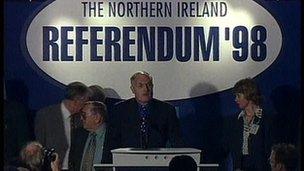Good Friday Agreement referendum: Unionists reflect 15 years on
- Published
Exactly 15 years ago - May 22 1998 - voters went to the polls to vote yes or no for the Good Friday Agreement. In the first of a two-part series, the BBC assesses the divisions that remain within unionism over the yes vote and where they are now.
.jpg)
Rock star Bono campaigned for a yes vote days before the 1998 referendum
It is 15 years since cheers filled Belfast's King's Hall when it was announced that 71% of people in Northern Ireland had voted yes to the Good Friday Agreement.
While almost all nationalists and others were cheering, only about half the unionists were rejoicing.
Indeed, they were sharply divided over the "yes" vote - and whether a majority of unionists had backed the deal.
As the leader of the "no" campn Ian Paisley, left the count centre the loyalists from the pro-Agreement Progressive Unionist Party (PUP) shouted "cheerio, cheerio, cheerio".
Fifteen years on, PUP leader Billy Hutchinson sees the irony in this - as the DUP is top dog at Stormont, sharing power with Sinn Fein, and loyalists are reduced to street protests over the union flag and other issues.
Would he have voted yes, knowing what he does now?
"Yes," Mr Hutchinson answered.
He added: "I would never say that I would have voted no because I think that yes was the thing to do at the time. Hindsight is a wonderful thing. But a lot of the 'i's weren't dotted and the 't's weren't crossed."
Given another chance, the PUP leader said he would insist on issues being nailed down.
'Told you so'
Jim Allister, leader of the Traditional Unionist Voice (TUV), said those loose ends were deliberate, aimed at conning the loyalists into believing they had signed up to a settlement rather than a process.
Mr Allister, like the UK Unionist party leader Robert McCartney, voted no 15 years ago.
Mr McCartney, according to a spokesman, now describes himself, not in the no camp, but in the "I told you so" camp.
Having split from the DUP over power-sharing, the TUV leader carries the mantle for those who still regard the agreement as a travesty, 15 years on.
But isn't it a rather small no camp these days?
"I'm not sure that it's a very small camp," Mr Allister said.
"I think when you scratch the surface there are a lot of unionist people in particular - and not just unionist people - but people across the community who recognise it is absurd we have got a system where you can't change your government where you can't have an opposition. So I think it is a growing momentum in that regard."
In 1998, the no camp argued that the Good Friday Agreement was Ulster's death warrant.
'Don't blame me'
Fifteen years on, Mr Allister must recognise this was an exaggeration?
He countered it is a "slow death warrant" in which Northern Ireland is being "fused" socially and economically to the Irish Republic, through all-island arrangements in healthcare and trade.

The results of the referendum were announced to a cheering crowd in the King's Hall
He argued that opinion polls which show strong support for the union, among Catholics, is the result of the death of the Celtic Tiger, rather than the agreement.
The DUP's Jonathan Bell is now a junior minister at Stormont in the Office of the First and Deputy First Minister. In 1998 he was an Ulster Unionist who knocked doors urging a no vote.
So was he wrong?
"No, in fact I'm really proud of saying 'don't blame me, I voted no'."
Fifteen years ago, Mr Bell had argued against prisoners getting out early. So how does he square this with sharing power with ex-prisoner and fellow junior minister, Jennifer McCann, and Deputy First Minister Martin McGuinness?
Mr Bell said the difference came with the St Andrew's Agreement, which ensured that power-sharing followed republican support for the rule of law.
He said the DUP had delivered stable power-sharing after three failed attempts.
Disillusion
While he boasts the union is safe, he gives no credit to his former UUP leader and insists this was down to St Andrew's.
"Nonsense," says the current Ulster Unionist leader Mike Nesbitt who, like Jim Allister, insists the DUP is working to a template from the Good Friday Agreement.
Mr Nesbitt now shares some of the disillusion of the PUP, and like the TUV leader, wants an opposition.
The UUP leader claimed the DUP-Sinn Fein led "coalition" is not much better than what went before under direct rule, when ministers with little affinity for Northern Ireland would fly in two or three days a week and make unaccountable decisions.
Fresh referendum
"I think the criticism of the people at the heart of the current devolved government is they fail to make decisions," Mr Nesbitt said.
"They fail to live up to the expectation that we would tackle the big ticket issues, issues like dealing with the past, reconciliation and building a truly shared future."
The DUP and Sinn Fein point out they are dealing with issues, citing the recent announcement on a partial shared future deal and moves to set up an all-party working group to deal with outstanding matters.
As for Mr Nesbitt, he now wants a fresh referendum - on creating an opposition.